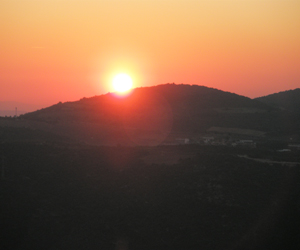Poetry Immersion in Tzfat
Reuven Goldfarb, Facilitator
Tzfat has a large English-speaking population, and two of the things that draw other Anglos to Tzfat is the already-existing English-speaking community and the organizations and institutions that it has created.
In recent years, this has become especially true as Anglo immigrants have organized, in addition to the popular English library, writing and drama groups, and book clubs.
Thanks to a resident who wanted to share his knowledge and love of poetry, a Poetry Immersion class has been created. This class meets weekly, and participants read aloud and discuss a variety of poems written by some of the most outstanding figures in literary history whose primary language of composition was English.
The group was founded by Reuven Goldfarb, whose love of poetry goes back to his childhood. Reuven majored in English and American Literature in college and wrote his Master's Thesis as a poetry collection. As he navigated his way through the '70s, his joys and griefs provided material for poems which helped him get "a handle on life." In 1981, he began publishing AGADA, the illustrated Jewish literary magazine. In the late 80s, Reuven began to teach Creative Writing, Journal-Keeping, and Reading and Composition at Community Colleges in northern California, an experience which provided him with a strong background for creating a his present Poetry Immersion class in Tzfat.
In early 2009, a short blurb in the local English-language newsletter about the founding of the group brought out several other residents who wanted to come together to explore English language poetry. With Reuven acting as the facilitator, they began to meet weekly, pleased to have a forum which allowed them to study and "immerse themselves" in this rich tradition.
Reuven selects the pieces that the group explores, along with some biographical information about the poets, which, he says, often helps the group to better understand the work. He clarifies the formal elements (meter, rhyme scheme, line length, and type of stanza). The participants take turns reading selections, pausing when the need arises to clarify references and terms, tone and narrative thread.
A "Wow" Moment
As Reuven describes it, "As we read aloud and then share our responses to the individual poem, on an emotional and ideational level, the author's intentions gradually reveal themselves. If we're lucky, there can be a moment when we all really get it, when we say, "Wow!" and no more comments or analyses are necessary."
The group began studying English and Scottish Border Ballads, then moved on to sonnets, and then to elegies and odes and dramatic monologues. Thus, the members have already explored various genres and styles, encountered a wide range of subject matter, and absorbed a multiplicity of poetic voices and approaches.
The gatherings usually attract approximately half a dozen participants, nearly always all Jewish, and as such, they take note of how Jews and Judaism are portrayed in the poems. Reuven carefully monitors the discussion to make sure there is enough time allowed for hearing each person's reactions, yet insuring that the group concentrates on the work itself and doesn't drift off into aimless free association and speculation.
Poetry Immersion takes a summer break but usually meets Sunday evening at 7:30. For more information, contact Reuven Goldfarb via [email protected].

